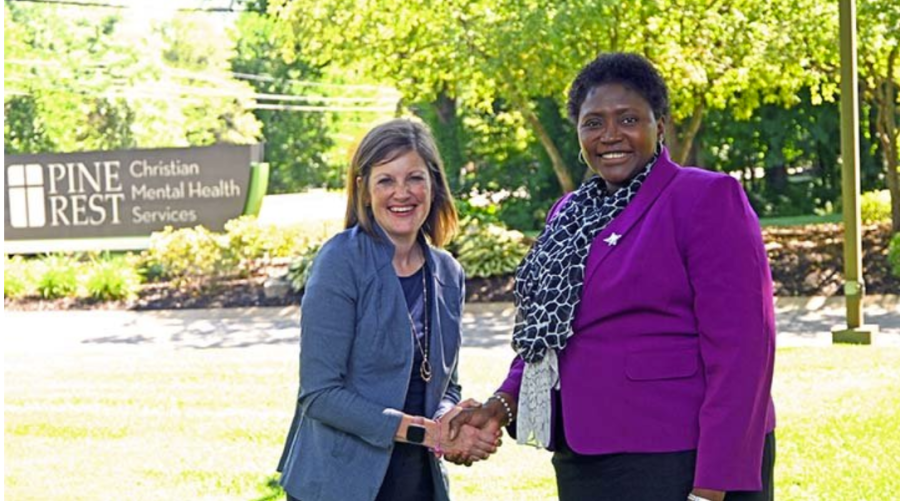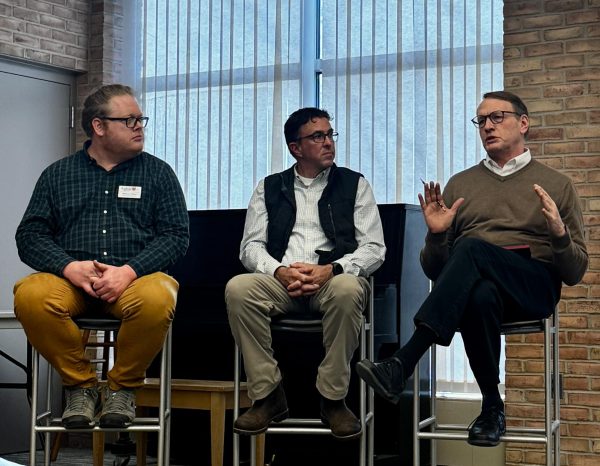Calvin joins fight to mitigate nursing shortage via partnership with Pine Rest
Gretchen Johnson (left), chief nurse executive at Pine Rest, and Adejoke Ayoola (right), dean of Calvin University’s School of Health helped form a partnership between Pine Rest and Calvin Nursing.
Recent years have seen a decline in both nurses and nursing faculty. A new partnership between Calvin University and Pine Rest Christian Mental Health Services aims to help address a growing shortage of nurses.
Due to low numbers of nursing professors in academia and a wave of nursing faculty retirement, many nursing programs have become more competitive in recent years, turning higher proportions of nursing students away and through that increasing competition among the use of clinical sites to train nurses.
According to the American Association of Colleges of Nursing’s report on 2019-2020 enrollment and graduations in undergraduate and graduate school nursing programs, U.S. nursing schools turned away 80,407 qualified applications in 2019. The majority of those programs cited insufficient number of faculty, clinical sites, classroom space, clinical preceptors and budget constraints as major contributors to their decision. Most nursing schools responding to the survey pointed to faculty shortages as a top reason for not accepting all qualified applicants into their programs.
High rates of nurses leaving the profession during the COVID-19 pandemic only added to this crisis. Pine Rest and Calvin are now joining forces to help address this shortage.
Partnership between Calvin and Pine Rest
The new partnership will see Pine Rest provide up to $10,000 in tuition assistance per semester (up to $40,000 total over two years) for at least six undergraduate students enrolled at the university (with that number expected to increase). In return, those students will agree to work at Pine Rest during their last two years of nursing school and for two years after getting their license from the State of Michigan. The students must stay employed at Pine Rest during the four-year period.
“I think it’s a great partnership because of Pine Rest’s mission as a Christian organization [and] Calvin’s mission as a Christian organization. So there’s a lot of shared values and mission overlap,” Associate Professor of Nursing Jesse Moes told Chimes. “But it also serves a pragmatic need: the need for nursing staff. And if this is going to help us staff our units and take care of the increasing demand of health professionals who help people with mental health needs, I think it’s a good partnership.”
Associate Professor of Nursing Jaclynn Lubbers is also optimistic about the agreement. “Let’s say you’re working at Pine Rest as a nurse technician. The incentive is for you to go to Calvin [while still working for] Pine Rest. So they’re trying to help their own employees and Calvin students kind of get into this pipeline …then the hope too is that the pipeline will turn around and bless Calvin,” Lubbers said.
Abigayle Dayton, a senior in Calvin’s nursing program, hopes the partnership will help expose more nursing students to the mental health field. “I’ve already been through a mental health rotation … I think that people are excited for it because … it gives good exposure,” Dayton said. “I think it gives people an opportunity to kind of settle into a state of, ‘oh, I do like this job, I’m gonna give Pine Rest the help it needs.’”
“Mental health nursing is important, and a lot of people are maybe nervous about it or turned off by it, maybe from a lack of understanding. But now with mental health becoming more talked about, it seems like some of that nervousness has been relieved,” Dayton said.
Nursing shortage extends to academia
The AACN expects one-third of the current nursing faculty workforce in undergraduate and graduate school programs to retire by 2025. The AACN has also found that those nursing professionals who are still in careers in academia tend to be over the age of 50.
“We’re kind of in an odd place as a country right now. We know we need more nurses, and so we would love to be able to educate more nurses. But what happens is you just don’t have the faculty or [the] capacity to do so,” Lubbers said. “Graduate school is expensive, although there’s a lot of programs and incentives right now to encourage nurses to go back to graduate school. But in the end, nurses who work in academia like myself … don’t make financially what our colleagues working in the practice setting make, not even close. So it’s hard to entice nurses to come back.”
According to Moes, larger research-focused institutions draw nursing faculty away from smaller, undergraduate-focused institutions, like Calvin. “At undergraduate … institutions like Calvin, teaching is a more important priority. It’s a larger part of your workload, but you’re still expected to research as well. So that research component, I think, turns a lot of people off just to grad school in general,” Moes said.
These trends ring true for Calvin’s current nursing students. Dayton said no one in her friend group is considering going on to become nursing faculty. “I don’t think it’s on many nursing students’ radars,” Dayton said. “I don’t know why because I’ve definitely considered doing it when I’m much older, but it does not feel like many young nurses want to go into it because [many first] want to work [and] gain experience.”
“Steps in the right direction”
Although the shortage of both nurses and nursing faculty is expected to continue, some healthcare organizations are already taking some initiative to deal with the expected shortage. This includes the new partnership between Calvin and Pine Rest, according to nursing faculty.
According to Lubbers, Calvin’s nursing program is working to integrate classes that show nursing students the benefits of going to graduate school, entering doctoral programs and becoming part of nursing faculty. Moes told Chimes he tries to encourage his students into pursuing not what gives them materialistic satisfaction but something that will give them fulfillment and meaning.
Lubbers and Moes are both confident in their students. “I think [this partnership with Pine Rest] is a great first step of, you know, just showing what our graduates are capable of,” Moes said. “And I think that’s why they approached us to say, ‘we want the students that you graduate to come and work for us.’ I think that’s a sign that we’re producing good students.”







